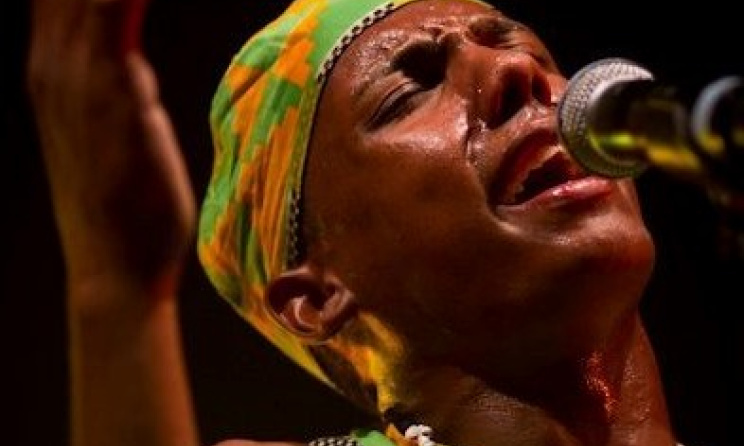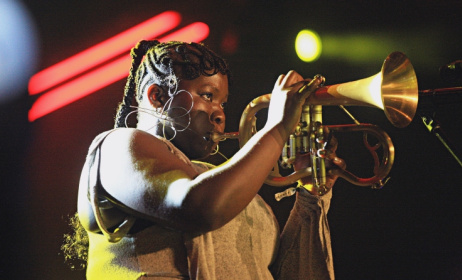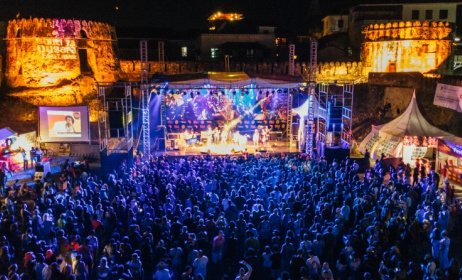"African leaders need to prioritize arts and culture"
By Journey Ramadhan
Evidence shows that the creative economy is an increasingly powerful driver of development. Figures published by the United Nations Conference on Trade and Development (UNCTAD) in May 2013 show that world trade of creative goods and services totalled a record $624 billion in 2011, more than doubling since 2002. The average annual growth rate during that period was 8.8%, with growth in developing-country exports of creative goods being even stronger; averaging 12.1% annually over the same period. Journey Ramadhan, projects manager at Busara Promotions in Zanzibar, wonders why African governments do not seem to prioritize arts and culture, despite the contribution of these industries to the economic growth...
 A member of the Loryzine music band. Photo: www.artistecard.com
A member of the Loryzine music band. Photo: www.artistecard.com A performance during Sakifo Musik Festival. Photo: Journey Ramadhan
A performance during Sakifo Musik Festival. Photo: Journey Ramadhan
Africans are fed up with the daily sweet-spoken policies from their leaders. Most of these are intoxicated with long-term leadership and completely out of touch with the citizens they are there to represent. Why do African governments not prioritize arts and culture which identify and express our roots? This industry is assumed as simple, regardless of its economic contributions to individuals and nations.
There are many festivals across Africa which were well launched but fail to survive because of lack of finance and support from governments. At the same time, in a few exemplary countries like Morocco, South Africa or Algeria, governments do strongly value and support festivals and the creative industries.
Statistics show the creative industry contributes billion of dollars a year and creates huge employment opportunities. I attended the 2015 edition of Sakifo Muzik Festival on Reunion Island, which followed three days of networking at the Indian Ocean Music Market. IOMMA gathered together many arts professionals from Africa, the Indian Ocean and across the world. We had a great opportunity to discuss key issues and challenges facing the creative industries. Here I had the chance to meet with artists and record labels, and see a splendid selection of artists showcases, including Hanitra (Madagascar), Loryzine, Zanmari Bare and Sofy Mazandira (Reunion) and many more.
Before my arrival, I was looking forward to land in a country where music and the arts are taken seriously by the government. It was my first time to be in Reunion but I felt at home because I am from another island in the same Indian Ocean.
I was introduced as coming from Zanzibar, and I was very pleased to see how Sauti za Busara is famous and much respected outside Tanzania’s borders. The festival has an excellent reputation for its music selection, programming, amazing venue (Old Fort), food and location, with its white sandy beaches. Most artists I spoke with have dreams to visit and perform at Sauti za Busara. I was overwhelmed with joy, while something clicked in my mind and reminded me of the Swahili proverb that says: “The prophet isn’t accepted at home”. I thought of my fellow countrymen and asked myself how do they regard, maintain and embrace the festival!? Sauti za Busara brings lots of people from all corners of the world to Zanzibar. They contribute to Zanzibar and Tanzania’s economy, bring job opportunities, strengthen artists networks and infrastructures, raise awareness of the arts and cultural interchange, employ more than 150 youth and offer training to develop their skills, provide opportunities for local artists to perform alongside international artists with more hefty benefits.
During my stay I got to meet and talk with many people from different parts of the world. Many said how inspired that had been when visiting Zanzibar and Sauti za Busara festival.
I was programmed as a speaker in a panel discussion, along with colleagues from South Africa, UK and Reunion. We shared overviews on “The importance of festivals in cultural and financial contribution”. The other panelists were demonstrating and sharing information on how their governments support and contribute to the arts and creative industries for the development of their countries. I was impressed by South Africa’s commitment. For instance, their speaker said the City of Durban contributes over R200million (anout US$14million) to the arts, and other events benefit from regular government support, such as the Cape Town International Jazz Festival, Moshito and many more. The representatives from London and Reunion also illustrated numerous examples of supports from their governments for nurturing and developing the creative industries.
When it came to my turn, I felt frozen due to all the insightful details and descriptions from the previous speakers. Most in the audience previously imagined Sauti za Busara gets huge financial support from the government in Zanzibar or Tanzania. I had to share our challenges and explain that in fact it has been quite the opposite, with Busara having to pay a lot of money to various government departments every year - for event licenses, work permits, withholding tax, venue rental, policing and security, even for putting posters on the streets. At the same time, a recently published report shows February is now the highest month in the year for arrivals to Zanzibar. Before Sauti za Busara started, February used to be low season in Zanzibar, with about 3000 visitors. Now the same month has 40 000 visitors. Even conservative estimates show since 2004 the festival has generated US$70million in revenues for the island. Around festival time local flights are full, as are hotels and restaurants. Taxi drivers and traders alike say Sauti za Busara week is now their busiest time of year.
Despite providing this huge contribution to the local economy, this year the festival organisers could not raise the funds required to put together an exciting and well-programmed event. We were left with little choice but to cancel the 2016 edition of East Africa's leading music festival.
After the meeting, lots of people congratulated me on my presentation. It was clear I had touched their feelings. An artist manager from Madagascar, whose group participated at Sauti za Busara 2015, said: “I saw your festival is well organized, I thought it is tremendously funded by the government”.
Clearly, the time has come for our government to support festivals, to keep arts and culture alive and to promote our country globally. Tanzania may be blessed with diverse cultures and incredible talent, but unfortunately without festivals these continue to remain largely unseen and unheard.



































Comments
Log in or register to post comments